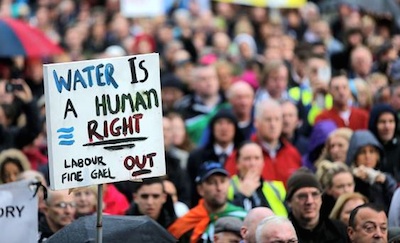“People talk about water. Water takes up about 3-5 per cent of my time.” (Irish Times interview with Alan Kelly, 5 January 2016). While not quite as memorable as his “power is a drug” interview in the Sunday Independent, this boast by the former Minister was alluded to a whole number of times in the subsequent weeks of the election campaign, as well as in response to the public tantrums he has thrown in response to the deal Fine Gael and Fianna Fáil struck for the imminent suspension of the charge.
At numerous junctures, from the time the anti-water charges movement erupted in autumn 2014 until the eve of this year’s general election, numerous attempts were made to effectively write the obituary of the campaign. Every significant tactical retreat by the government; from the delaying of the introduction of the charge in the first place; to the temporary lowering of the bills until 2018; to the €100 conservation grant, were predicted by media commentators as sufficient measures to overcome the opposition.
It is emblematic of the bubble-like existence of the commentariat and the politicians of capitalist establishment that only when they were forced to engage in some class of dialogue with working class people in the course of this year’s general election campaign did the realisation dawn on them that water charges were still a huge issue for people. The wearing effect of establishment party candidates and their canvassers being verbally pummeled night after night on the doorsteps percolated up to the media, but also to Fianna Fáil’s leadership to the extent that notwithstanding the fact they, when in government in 2009, agreed to the principle of introducing the charge, moved to a position of promising their suspension in their 2016 election manifesto. However, in the course of the election some individual Fianna Fáil candidates in working class areas went even further in promising abolition of the charge on their posters.
The manner in which the water charges forced their way in to the national debate in the midst of the general election campaign, combined with the actual result that saw the outgoing government lose some fifty seats, formed the backdrop to the post-election negotiations around government formation.
The boycott and The electoral tactic
It is worth reflecting back briefly on the debates that took place within the water charges movement about what role the elections should play in the overall struggle to defeat the charges. The position held by the Socialist Party and the Anti-Austerity Alliance (AAA) from the outset, and likewise instinctively understood by many working class people, was that the boycott of the charge was the absolute bedrock for the defeating the charges – in the sense that even if we achieved on all the other important tactics like the national marches and meter protests, which by definition only involved a minority of people (the more active layer), we needed to gear everything towards convincing an additional hundreds of thousands of householders to not paying the charge.
This was frankly not the position of the leadership of the Right2Water unions and Sinn Féin. Other forces like People Before Profit, left Independents and some community based groups, while nominally supporting the boycott, did little to actively organise it in communities or challenge the Right2Water unions and Sinn Féin for their weaker position on the issue, which given their larger size and influence in society meant that the potential for winning this struggle sooner was not being fully realised. In fact their arguments for refusing to support the boycott gave credence to the establishment’s lies and scaremongering about the supposed dangers of the boycott, which meant that their position on the issue wasn’t neutral, rather it served to undermine the correct arguments being made in favour of the boycott.
The debates provoked by the Socialist Party and AAA within the Right2Water movement, as well as necessary initiatives under the banner of We Won’t Pay and with others in the Non-Payment Network – which placed the correct emphasis on the boycott tactic – led to us being singled out for attack by prominent officials among the Right2Water unions and Sinn Féin representatives, as well as a minority of community based activists over which they had some influence, for supposedly dividing the movement. Our starting point in all of these controversies was always what was necessary to win this struggle and to argue for that position, which in general was readily accepted by most working class people we interacted with on stalls, demonstrations and public meetings. If one imagines for a moment, what position the campaign would have been in had there not been a large boycott intact during and after the recent elections, it is clear that despite the anger Fianna Fáil witnessed on the doorsteps they would have felt far less pressure on the issue.
General election campaigns
Instead of focusing on the boycott, under the Right2Change initiative the unions emphasised the requirement of achieving a majority in the Dáil made up of parties and independents who outrightly opposed the charges, and by implication if such a majority was not achieved we would be stuck with the charge and the campaign would have nowhere further to go.
The Socialist Party and AAA, did hold the perspective that the left, Sinn Féin and independents who opposed the charge were well poised to make gains and the traditional capitalist establishment parties (Fine Gael, Fianna Fáil and Labour) were likely to see a corresponding further decline in seats. However we also held the view that it was completely unrealistic to expect their complete displacement and exclusion from power and to hold that out as the central objective could have a dangerous disorientating and demoralising effect on people opposed to the charge.
The key question for us was the necessity to defend and extend the boycott of the water charges and mass mobilisations on the streets to maximize pressure on whatever government came to power. This contrasted with Sinn Féin’s approach. A week before the general election, they produced a billboard claiming that only a Sinn Féin government could abolish water charges.
Brendan Ogle from UNITE (the trade union official most prominently associated with Right2Water and Right2Change), clearly underestimating the external pressure on the political establishment on this issue, recommended that Sinn Féin and the Left support a Fianna Fáil nomination for Taoiseach in return for an immediate abolition of the charge. Ogle did not venture what principles Sinn Féin and the Left should have been prepared to ditch in return for a deal on water charges, but in any event, his proposal gained no traction.
Water pressure in negotiations
In the aftermath of the elections, the AAA and other groups within the anti-water charges movement impressed upon the Right2Water unions the need for a national mobilisation on the water charges while the government formation negotiations were ongoing, in order to pile the pressure on the political establishment. The Right2Water unions instead emphasised the struggle within the parliament and facilitated support for a motion calling for abolition that Sinn Féin, Anti Austerity Alliance – People Before Profit, Independents4Change and the Social Democrats signed up to but was voted down by a combination of Fine Gael, Fianna Fáil, Labour, Green Party and right-wing independents.
Despite the Right2Water unions not making the call for a national demonstration, Fianna Fáil clearly still felt the pressure not to totally abandon the position they took on the water charges in the midst of the election campaign. Water, more than any other issue proved a sticking point in their negotiations with Fine Gael and had the fudge of suspension not been agreed we could have had an immediate fresh general election. The very fact that the water charges were featuring prominently as a condition for supporting a Fine Gael minority government served to build confidence among people that victory was possible. Simon Coveney’s comments shortly after the election to the effect that concessions on water were a possibility, led to front page headlines about a resulting stampede of cancellations of standing orders and direct debits among those who had reluctantly paid the charge up to that point, something Irish Water took over a month to confirm as they deliberately withheld payment figures since late 2015.
The terms of the Bill, which will give effect to the suspension of the charge from 1 July 2016 while a commission looks into alternative means of imposing charges, it provides for no further accumulation of penalties. What that means is that the maximum arrears a household can have at this point is €360, which is below the €500 threshold the previous water legislation required before Irish Water could pursue individual householders through the courts. AAA and other left TDs, while maintaining a position of complete abolition of the charge are fighting for other amendments to the suspension legislation, including the wiping out of arrears, the reimbursement of those who were bullied into paying and a complete suspension of the metering programme.
To these demands we must also add the dropping of charges against the Jobstown protesters and any other campaigner who faces criminal charges for their activity against the water charges and the expunging of criminal records that anybody has picked up as a result of prosecutions.
Against complacency on water charges
We have to be prepared for the possibility that the commission will report back with a recommendation with an altered charging regime, possibly with exemptions or waivers for people on social welfare and pensioners. The hope will be that such further concessions will serve to deactivate a significant chunk of the population who have been stalwarts in the movement against the charges and who were a high proportion of the 50% plus who have been non-compliant with the charge to date.
Some of the utterances from Fianna Fáil suggest that they might settle for such a compromise. This will pose a fresh challenge to the movement and initiatives will need to be taken in anticipation of the commission report to remind Fianna Fáil of people’s fundamental opposition to charges in any form. In particular, a national demonstration must be scheduled by the Right2Water unions in cooperation with the other parts of the movement, with Fianna Fáil and the “Endapendants” like John Halligan and Finian McGrath who claimed to be opponents of the charge being a particular focus. In the end, whatever the recommendation of the commission, it will be for the Dáil to legislate or not for the re-introduction of the charge. In the wake of the bin charges experience, from the time of the introduction of the charges over a decade ago culminating in the recent pay-by-weight debacle, working class people are far wiser now about the use of waivers as a means to divide opposition.
The prominence of the water charges in the negotiations on government formation led to a rebuke from some media quarters, that water is not the most important issue. On one level this is true, but water charges proved to be the great unifier for all those angry about austerity and who were unable to effectively oppose the many other cuts and impositions. There is already a legacy of tens of thousands of people becoming more politicised and generalising from the experience they have gone through in this struggle about the nature of the capitalist system and the role of the media and the Gardai. Networks, to a large degree via social media, have been built up that can be again employed for other campaigns and struggles.
Exploiting a weak government
It has already been well demonstrated in the short lifetime of this minority government, that it can be forced into retreats. Besides the suspension of the water charges it has already been outvoted on some opposition motions and bills because of the Dáil arithmetic. More importantly it is the external pressure they feel on issues like bin charge hikes, linking child benefit payments to school attendance and the continuation of activation schemes like Jobbridge that has led to backtracking.
This needs to be replicated around other major issues such as housing, healthcare and the restoration of public service pay. Working class people, driven by the success of the water charges struggle, but also a trumpeted recovery that mainly benefits the super-rich, are right to take full advantage of this weak government. The potential to build a left working class political movement is also evident, in which the AAA will play a vital role.












